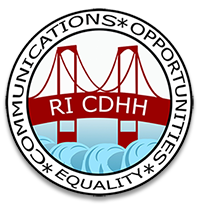Business & Public Accommodations
Equal and effective communication between spoken English persons and American Sign Language (ASL) users is critical for a successful partnership and resolution.
Deaf and Hard of Hearing people usually give and receive information through sign language or printed text rather than through speech.
Under Title III of the Americans with Disabilities Act (ADA), businesses and public accommodations are obligated to provide reasonable accommodations (auxiliary aids and services), to communicate effectively, with Deaf and Hard of Hearing people.
Here are some examples of communication aids and services
•American Sign Language interpreters
•Video remote interpreting
•Notetakers
•Large print materials
•Captioning
•Accessible electronic and information technology
•Other similar services and actions
The goal is to find a solution that fits the circumstances.
RICDHH stands ready to work with RI businesses and public accommodations to ensure that our Deaf, Def-Blind, Hard of Hearing, and Hearing Loss Rhode Islanders have and will continue to have equally effective access to communications and information.
Click the entity to obtain more information on how both communities become successful partners, just like in the general population.
